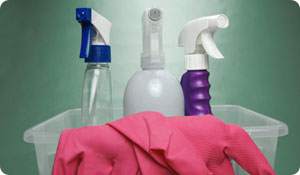
The results of a recent study made news with scary, attention-grabbing headlines such as "Household cleaners may double risk of breast cancer," and "Could being too houseproud raise the risk of breast cancer?" The study in question stated that women with the highest self-reported use of household cleaning products had twice the risk of developing breast cancer.
The study took place in Cape Cod, which has a higher-than-average incidence of breast cancer. The researchers found a modest association between cleaning product use and cancer, but also acknowledged the possibility that recall bias may have affected the results. The American Cleaning Institute and others quickly refuted the study.
So, in light of these inconclusive results, should you stop using cleaning products? Here's what we do know.
- The National Cancer Institute (NCI) attributes about two thirds of cancer cases to environmental factors, including tobacco, alcohol, food, radiation, infectious agents, and substances in our air, water, and soil, and one to five percent to air, food, and water pollution.
- The environment (everything outside the body that enters or interacts with it) influences cancer rates and risks, as does each individual's genetic makeup. So, everyone's risk of developing cancer is different. Cancer grows slowly making it difficult to tie an individual's early exposure to something potentially carcinogenic to developing cancer later in life.
- The Federal Government links about 220 substances (including some solvents) to cancer. Many household products contain chemicals that disrupt the delicate balance of hormones (such as estrogen) and affect the growth of estrogen-sensitive human breast cancer cells.
- In May, the President's Cancer Panel reported that exposure to environmental contaminants has a stronger impact on cancer risk than originally estimated. Of the roughly 80,000 chemicals we use in the U.S., scientists have not adequately studied many of them and most are largely unregulated.
- The chair of the President's Cancer Panel said, "the increasing number of known or suspected environmental carcinogens compels us to action, even though we may currently lack irrefutable proof of harm...The prevailing regulatory approach in the U.S. is reactionary, rather than precautionary, meaning that human harm must be proven before action is taken to remove or reduce exposure to an environmental toxin."
- In other words, the panel recommends that we take preventative action in the face of uncertainty rather than waiting for definitive proof of harm.
Despite lack of concrete evidence linking household cleaning products to increased breast cancer risk, you may want to take extra safety precautions when cleaning or use less toxic alternatives to commercial cleaning products.
Sources
Zota, Ai R., Aschengrau, Ann, Rudel, Ruthann A., and Brody, Julia Green. "Self-reported chemicals exposure, beliefs about disease causation, and risk of breast cancer in the Cape Cod Breast Cancer and Environment Study: a case-control study." Environmental Health 2010. Web.
http://www.ehjournal.net/content/pdf/1476-069X-9-40.pdf
"Cleaning products and breast cancer - what's the real story?" Cancer Research UK. Web. 20 July 2010.
"ACI Refutes Study Attacking Cleaning Product Safety, Links to Breast Cancer." American Cleaning Institute press releases. Web. 20 July 2010. http://www.cleaninginstitute.org/aci_refutes_study_attacking_cleaning_product_safety/
Nelson, Roxanne. "President's Cancer Panel: Environmental Cancer Risk Underestimated." Medscape Medical News. Web. 13 May 2010. http://www.medscape.com/viewarticle/721766





